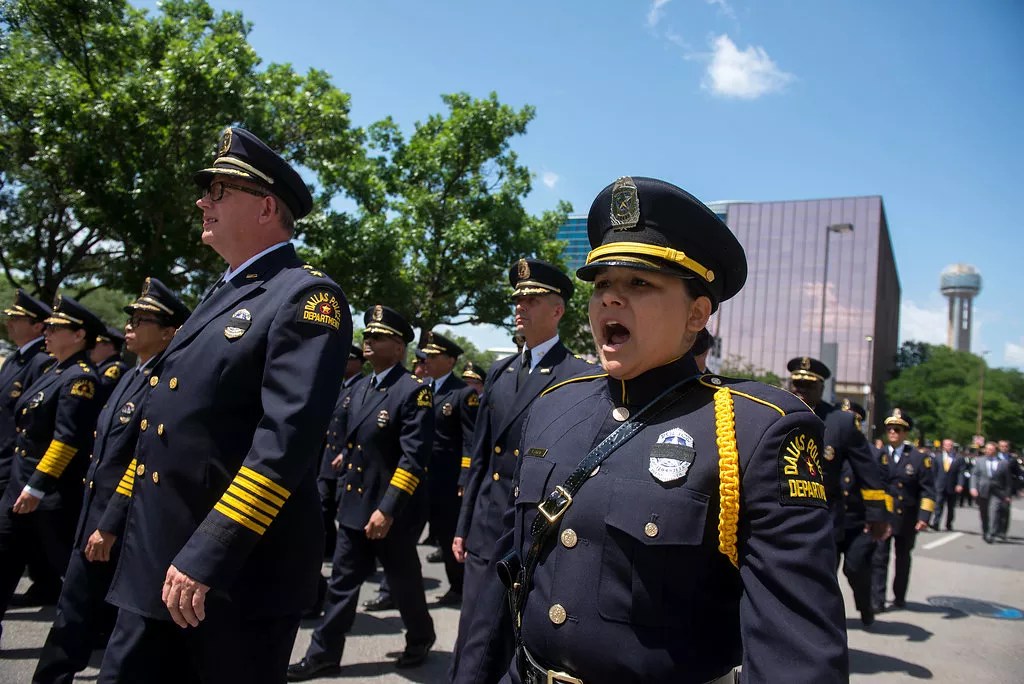
Wetzkaz Graphics via Shutterstock

Audio By Carbonatix
Faced with the real threat that Dallas could go bankrupt if it loses a bundle of police and firefighter pay lawsuits, the mayor and a majority on the City Council are ready to roll the dice. They’ve rejected a potential $300 million settlement offer, choosing instead to take their chances in a Collin County courtroom.
Dallas will walk out of that courtroom either clean as a whistle or broke.
That’s no exaggeration. The potential for six separate police and firefighter lawsuits over back pay to put Dallas on the same bankrupt shelf with Detroit is one of the core calculations being made by both sides.
The suits could have been settled this summer for less than 8 cents on the dollar, but that window appears to have closed.
The suits could have been settled this summer for less than 8 cents on the dollar, but that window appears to have closed.
There is even a Detroit number for the settlement that both sides have kicked back and forth. That number, $300 million, is what the plaintiffs, who now number almost 10,000 persons, indicated at one point earlier this year they might consider accepting as a settlement. Why is that a Detroit number? Because that’s where the calculation comes from.
The total potential hit that Dallas would suffer in a courthouse rout, according to lawyers for the plaintiffs, is more than $4 billion. That’s $1.4 billion in actual damages plus interest since 1978.
The same day any number like that becomes fact, Dallas goes virtually belly-up. In fact, the city would be bankrupted by a fraction of that amount. So what would the plaintiffs get if they broke the city? Their side went to Detroit to find out.
***
When Detroit filed for bankruptcy in 2013, it was $18 billion to $20 billion in the hole, making the Detroit case the largest municipal bankruptcy in U.S. history. At the end of a yearlong process, Detroit’s creditors ate $7 billion in debt that would never be repaid to them.
The lesson from the bankruptcy of Detroit – which, in the end, got screwed – was not exactly what many observers, notably Wall Street, had expected or hoped for. At the outset, the law seemed to favor bond holders who had been pledged the city’s so-called “full faith and credit.”
But as things progressed in Detroit, the principle of full faith and credit lost a war with politics. In the end, the thing most protected from loss was the Detroit Institute of Arts. Next most protected were pensioners. The bond holders were back down the line in third place and not happy about it.
People holding civil judgments against the city – as Dallas’ first responders would be if they won – had to line up for leftovers. So the $300 million figure is the leftover that the plaintiffs in the Dallas police and firefighter lawsuits figure they’d get if they bankrupted the city first.
Their representatives told the city at one point they might settle for the Detroit number, rather than go through the agony of busting the city and then waiting for a settlement from the bankruptcy case. In May, when the Texas Legislature was in session, that deal briefly was folded into another deal on pension issues, and it looked good. Briefly. Then the deal fell through the cracks of a raucous legislative session and never happened.
A faction on the City Council, led by Oak Cliff member Scott Griggs and East Dallas member Philip Kingston, had proposed that Dallas ask the Legislature to allow the city to create a public safety authority similar to one in Fort Worth. In the first proposed iteration, the new Dallas authority would have been funded by diverting to it a portion of the sales tax that Dallas now gives to the regional transit authority.
The public safety authority would have used that money both to help solve the city’s police and fire pension shortfall, which was then before the House, and to pay off the plaintiffs in the back-pay lawsuits. That idea had some chance of success in the conservative House because it involved no new taxes.
The plaintiffs were insulted. Now everybody is off to the courthouse, where the first of six cases is scheduled to go to trial in December in Collin County.
But when taking money away from the transit authority proved politically impossible, the proposal for a public safety authority morphed. The new version involved a power to levy new taxes, which rendered the whole thing DOA in the House. The House took the city’s pension problems in a new direction, and the matter of settling the back-pay lawsuits was lost in the shuffle.
The city later salted the wound by offering the first responders half the Detroit number – $150 million. The plaintiffs were insulted. Now everybody is off to the courthouse, where the first of six cases is scheduled to go to trial in December in Collin County.
***

Dallas police officers attend the 2017 Dallas police memorial.
Brian Maschino
The deal numbers – the $300 million settlement offer and the $150 million counteroffer – were confirmed to the Observer by two City Hall sources speaking on background and later by one source on the plaintiffs’ side, lead attorney Ted Lyon, who spoke on the record after the Observer presented him with the number.
“At one time, we had a deal with almost all of the firemen and policemen to work a deal with the city for $300 million,” Lyon said. “After looking at all the aspects of the case, we considered that to be a figure that our clients would accept, that wouldn’t bankrupt the city and that was a reasonable settlement in terms of all the obligations the city had.”
Lyon said his side is still engaging in what he called “productive talks” with the Dallas city attorney, but the plaintiffs have not received any encouragement on a settlement from Dallas Mayor Mike Rawlings and the City Council. Sources close to the litigation tell the Observer the council is split, with a majority led by the mayor opposed to a settlement at the Detroit number.
“This thing is barreling toward a trial in December,” Lyon said. “Once a verdict is issued, it’s going to be extremely hard for my firemen and policemen to settle a case.”
Lyon suggested that some police and fire officers were satisfied with the pension fund settlement reached by the Legislature earlier this year, but many others were not. Any lingering bitterness over the pension battle might color the mood of the plaintiffs in the back-pay lawsuits, which are a distinct issue from the pension. A significant number of police and fire officers might still harbor bitterness toward City Hall, Lyon said. If the court hands the plaintiffs a victory on legal issues, many uniformed officers may not be in a generous mood toward the city.
Rawlings was not happy when the Observer asked him to address specific numbers – the $300 million offer from the plaintiffs and the city’s counter of $150 million. “The possibility of settlement goes really far down when people start to try to have settlement negotiations through the press,” he said.
“The possibility of settlement goes really far down when people start to try to have settlement negotiations through the press.” – Mayor Mike Rawlings
“I am blown away by the [lack of] discretion that would be putting numbers out to the public when [there were agreements that] you wouldn’t do that publicly. So that’s a whole other factor now.”
The Observer got the settlement numbers originally from off-the-record third-party sources familiar with the legislative debate in Austin and not from the plaintiffs or defendants.
Rawlings is not intimidated by the prospect of going to trial. “We are planning on going to trial,” he said. “I have studied it deeply and probably know more about this than anybody outside the lawyers, given the amount of hours I have spent on it.”
***

Dallas City Council member Scott Griggs backed a plan in the Legislature to create a public safety authority that might have helped solve pension and pay issues with the city’s first responders.
Mark Graham
If there is a trial, the question for the jury will be fairly simple – a matter of one word, in fact. But it took the Texas court system 23 years to decide what that word was. Since the first of the six cases was filed in 1994, lawyers and judges have chased the question up and down the legal tree like monkeys, from trial court to appeals courts to the Texas Supreme Court and back.
“It’s the oldest case in Texas, and I have been told it’s the oldest case in the United States that hasn’t gone to trial,” Lyon said.
In June 2002, the city won some and lost some from the Fifth Court of Appeals in Dallas. The appeals court ruled that a key phrase in a 1979 city ordinance on police and firefighter pay was “patently ambiguous” and that only a jury could figure out what it was really supposed to mean. With that one finding, the court turned this entire multibillion-dollar battle into a séance.
What did Dallas really mean in 1978 when voters overwhelmingly approved a pay increase for cops and firefighters in a citywide referendum? What did Dallas intend to see happen? At trial, the entire contest will turn on that question of communal mindreading.
In 1978, Dallas voters approved a 15 percent pay increase for all of the city’s first responders, but with a curious wrinkle. The language of the ordinance also said the city had to adopt a pay schedule “maintaining the current percentage pay differential between grades in the sworn ranks.”
In other words, if a given superior rank had a base pay level that was 20 percent higher than the base pay for a certain lower rank before the new post-referendum pay schedule went into effect, then that difference in pay levels had to be maintained in the new schedule. That’s not the ambiguous part.
The language on the ballot proposition was apparently clear. The ballot charged the city with “maintaining the current percentage pay differential between grades in the sworn ranks.”
But what does maintaining mean? For how long? The question for a jury, in fact, will come down to that one word. Did the voters assume the ballot language meant the pay differential would be maintained only in the first new pay schedule devised after the referendum? Or did maintaining mean the pay differential was to be frozen in place forever?
What does maintaining mean? For how long? The question for a jury, in fact, will come down to that one word.
It wasn’t. By the late 1980s, various pay raises and pay cuts directed at certain ranks had made a shambles of the 1978 pay differentials. In fact, testimony in the various lawsuits so far has shown that staff turnover in the city’s personnel department had erased all institutional memory of the 1978 referendum. Nobody even knew it was there.
In the 1990s, after some uniformed personnel had begun to complain that the referendum was being flouted, the City Council took actions which the plaintiffs now claim were official acknowledgments of the city’s mistake. On May 20, 1998, the council went into secret executive session to discuss the matter.
A week later, the city’s head of human resources crafted a memo telling the council what had to be done to get the pay levels back into compliance with the 1978 ordinance. That head of human resources, Mary Suhm, who went on to become the city manager in 2005, has already been deposed and will be called as a witness for the plaintiffs if the first case goes to trial in December.
Another witness sure to be called by the plaintiffs was a young labor lawyer in 1978 when he crafted the 1978 ballot language. He is now 95th Dallas Civil District Court Judge Ken Molberg.
When Molberg has testified in earlier stages of the litigation, his meaning has been clear. According to Molberg, “maintaining” meant forever.
Molberg has testified under oath: “The major intent of this provision was to keep that distance. In other words, if somebody got a raise at this level, you are going to have to give them a raise at the next level.
“If somebody got a decrease, and it worked both ways at this level, it would effectively decrease everybody’s salary, and that was to make sure that somebody couldn’t get in there and destroy the intent and the effect of this pay raise and to prevent retaliatory conduct.”
The plaintiffs, then, will call the author of the ballot language, who will say maintaining is forever. Then they will call a now retired Dallas city manager to explain why she told the City Council 20 years ago it had to vote for a new pay scale in order to get things right with the 1978 referendum.
The plaintiffs also will call a team of accountants who will explain how much money the plaintiffs are owed in actual damages and interest because the city never got the pay schedule right.
Attorneys for the city declined to discuss pending litigation, but the city’s main arguments by now are public record. The city still wants to fight a battle over the legal principle of sovereign immunity, even though earlier court rulings already have significantly eroded the city’s position on sovereign immunity.
Normally, sovereign immunity protects the city from being sued, but that protection goes away if the city has entered into a contract with somebody and that party is suing over a breach of the contract.
In this case, years of court battle have gone into this question already, culminating in a significant appeals court ruling that a jury might decide that the 1978 pay referendum constituted a contract and that Dallas, therefore, was not immune from suit. The city’s most recent filings contain fresh arguments for immunity and against the existence of a contract.
The city also is arguing that the plaintiffs took too long to file some of their claims and that the city is protected from other claims by the statute of limitations. And the city argues that acts of the Legislature have ratified some of its actions.
***

Dallas litigators and plantiffs look to Detroit for clues as to how much they might accept as a settlement in light of possible municipal bankruptcy.
Paul Bica
There is an inside-baseball aspect to this complicated bundle of litigation which neither side would discuss on or off the record. But other third parties, looking in from the outside, were willing to offer some kibitzing on a not-for-attribution basis.
Using various delays and rescheduling, the plaintiffs have arranged their cases in a certain batting order. The smallest case, involving fewer than a dozen plaintiffs, will go first in Collin County. The cases farther back in the order are the ones with thousands of plaintiffs gathered together in a class.
The claims in the overall litigation average out to something between $140,000 and $400,000 per individual. If a Collin County jury were to give the cops and firefighters a complete victory over the city, the total hit would be less than $5 million. In order to get there, the jury would have to decide that the 1978 referendum amounted to a contract and that maintaining the pay differential meant forever.
Lyon confirmed that if he and the other lawyers for the plaintiffs get their hands on a jury finding to that effect, they will invoke the legal rule of res judicata, meaning that those questions are settled and the city can’t bring them up again in subsequent trials.
With a loss on the contract issue, deprived of sovereign immunity and contradicted on the word maintaining, the city almost certainly would see the rest of the six cases fall against it like dominos. That’s where the billions of dollars and the bankruptcy happen.
By appealing every aspect of the case over such a long period of time and ultimately losing so many of those appeals, the city has painted itself into a corner. For example, the courts already have ruled that the city cannot tell the jury in Collin County what the ultimate domino effect of its verdict might be. Dallas won’t be able to talk about the other cases.
Jurors in conservative Collin County, who may tend to think of Dallas as some kind of liberal California cousin, can hand a victory to the cops and firefighters, thinking they’re only giving a big city like Dallas a price it can easily afford to pay – but that price could be the match that lights the bonfire.
“It’s very clear that it was a qualifier to the earlier point that everybody gets a raise, a one-time raise, by the way. Everybody publicly made the statement that this is for one time.” – Mayor Mike Rawlings
The same outside observers who pointed out the city’s disadvantages in all this, however, agreed with Rawlings on a central point: No matter what Suhm thought the city had to do 20 years after the referendum and no matter what Molberg says now about the ballot language, Rawlings contends it’s ridiculous to think voters in 1978 wanted to freeze the city into a specific pay schedule forever.
“It’s very clear that it was a qualifier to the earlier point that everybody gets a raise, a one-time raise, by the way,” Rawlings said. “Everybody publicly made the statement that this is for one time.
“They wanted to make sure that some people didn’t get more of a raise than other people got, and that’s why they maintained those levels. But I have searched the world over, and I cannot find one piece of historical data that says anything different than one time.”
Deciding after the fact what the voters really meant in an election is fraught with perils. Under American jurisprudence, as experts already have testified in these cases, a decision made directly by the voters is held to be of a “higher dignity” than any subsequent resolution, interpretation or administrative action based on that vote. The voters go first, in other words, and the voters always rule.
In the 2002 appeals court opinion, the court gave the city a sharp slap for one of its arguments, telling the city, “This argument is nothing more than a backdoor attempt to contest the election more than 20 years after it was held.”
So it all comes back to maintaining. Rawlings said, “The city of Dallas did nothing wrong. We are prepared to explain that to a wise jury and go from there.”
But if that wise jury decides maintaining is forever, the phrase, “We go from there,” may mean another trip to Detroit.